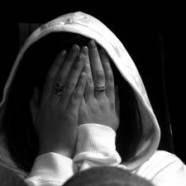
In his book, The Neuroscience of Psychotherapy (2010), Pepperdine University professor and psychologist Louis Cozolino writes about the crippling effects of “shame” on human beings. Behaviorally, a shame state often expresses itself as a downward gaze, a bowed head, or rounded shoulders; similar to our scolded pet dog’s hunched frame, slinking away behavior, and “tail between the legs.”
Contrasting an infant’s first and second year of life, Cozolino observes that a child’s increasing “mobility” changes how parents care for their young.
“As the infant transforms into a toddler, a parent’s role comes to include protecting the child from danger such as falling down stairs, being bitten by stray dogs, or drinking fabric softener. The emergence of normal, incessant exploratory behavior in toddlers is driven by the brain’s intense need for stimulation and growth. Due to the toddler’s increasing motor coordination and exploratory drive, parents find themselves protectively saying ‘No’ beginning at about 18-24 months….Affection and attunement, experienced as unconditional during the first year, come to be tied to limit setting, control, and early attempts at discipline.”
It is here, says Cozolino, early in the second year of life, that “shame” makes it appearance, both as an emotion and form of discipline. While disapproval by parents is initially confusing and frustrating to the child, it soon begins to shape the toddler—biologically and psychologically—for better…or worse.
“For better” means that temporary shame states are repaired by positive parenting; for example, a parent’s consistent ability to empathize with a child’s feelings, and then translate those feelings into words – helps the little one associate feelings with words. “For worse” means something entirely different. Here, temporary shame states become prolonged and repeated shame states which metastasize, like cancer, in a person’s body and psyche; what therapist John Bradshaw calls “toxic shame.” Cozolino calls this kind of shame “the emotion about (one’s self) that is internalized before the ability to distinguish between one’s behavior and one’s self.” When one’s behavior is unacceptable, we call that “guilt.” “Guilt” says: “I did something bad.” “Shame” says: “I am bad.” This toxic shame becomes the unfortunate (and unnecessary!) albatross that many people carry around in life – and sometimes, thankfully, carry into therapy.

